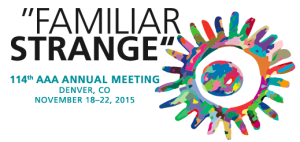
By Kedron Thomas
Saying no is hard to do. Especially when faced with a variety of teaching, service, research, writing, collaborative, and personal demands early in your career. At a workshop event held on Thursday evening in Denver, Ilana Gershon and David Nugent shared their insights and suggestions for how to avoid over-committing yourself in the early stages of an academic career, when to say no, and when to definitely say yes to scholarly and service opportunities. The event, titled, Commitments: Using Time Wisely Early in Your Career, brought graduate students and post-graduates at various career stages together to ask questions and voice concerns about time management and successful career planning.

David Nugent, Professor in the Department of Anthropology and Director of the Master’s in Development Practice Program at Emory University, encouraged early career scholars to pursue activities that will help to build professional connections to colleagues in senior positions. Organizing an event or speaker series or engaging in a collaborative research or writing project that involves senior faculty in your department or other people in positions of authority can be a great way, Nugent noted, to actively shape your professional environment and make yourself invaluable to a department or program’s overall success.

Gershon, Associate Professor in the Department of Communication and Culture at Indiana University, advised workshop participants to gather information about professional expectations from people in positions of authority as well as peers in their workplaces. She advocated that early career scholars also seek out a “committee of NO,” a group of friends and colleagues who will push you to weigh the potential costs and benefits of a writing project, committee position, or other commitment before you agree to take it on.
Participants in the workshop also shared their own experiences and discussed challenges that may be increasingly common given a shifting academic job market and economic landscape. For example, attendees talked about the difficulties of assessing and meeting professional expectations in interdisciplinary departments with few or no other cultural anthropologists, where colleagues may not be familiar with anthropology’s disciplinary norms. Questions were also posed about the proliferation of teaching-based, part-time, and non-tenure-track positions at colleges and universities in the United States and abroad, and the variety of expectations and commitments that can accompany these forms of employment. The event offered an important forum for considering the many concerns faced by early career scholars and left participants with a breadth of insights and very practical advice on how to be successful.
